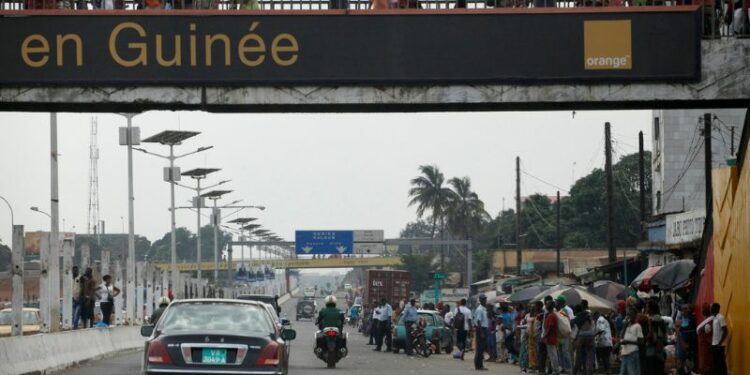Guinea’s capital, Conakry, was the scene of dramatic events over the weekend of November 4-5. In the early hours of Saturday morning, heavy gunfire broke out in central Conakry with reports soon circulating that the former Guinean president and three others had escaped—or been kidnapped, depending on the account—from Guinea’s main prison. Rumors started flying. Was it a jailbreak? Was it hostage-taking? Was it a diversion tactic during an attempted coup?
Aside from their sensational nature, these events matter deeply. In Guinea and beyond, they raise vital questions about justice, sovereignty, and the International Criminal Court in Africa. Guinea’s former president, Moussa Dadis Camara, is currently the lead defendant in a ground-breaking criminal trial taking place in the country. Dadis, as the former president is commonly known in Guinea, was head of a short-lived and largely unpopular military regime in 2009. Under his rule, the army viciously cracked down on a pro-democracy protest on September 28 of that year, killing at least 157 people and raping more than 100 women.
September 28 is an important day in Guinea’s calendar. On that day, in 1958, the Guinean people voted for independence from France and rejected plans to join the French Community, an organization meant to maintain close ties between France and its former African colonies. With this vote, Guinea became the first French colony in Africa to gain its independence. The stadium where the violence occurred in Conakry is named after this date, marking its significance as a moment of national pride.
In 2009, Dadis’ regime oversaw a horrific new historical layer added to this date. And despite inquiries, evidence, and demands for justice over the years, the perpetrators of this atrocity were never charged or prosecuted. On September 28, 2022, however, in a move designed to reclaim the date, a criminal trial opened in Conakry to bring about justice for the victims and the nation. The Procès 28 septembre has unfolded in Guinea for over a year, with eleven former military officers – including ex-President Dadis on trial for their role in the massacre. Witnesses and victims of the violence, including rape survivors, have testified in closed and open sessions before the court to detail the horrors they endured in 2009. Moreover, Guinean people have avidly followed the proceedings, which are being broadcast on local television and have been the subject of extensive discussion in the media and on the street.
A key reason that Guinean people are so invested in the Procès 28 septembre is that it is a domestic trial. It is taking place before a Guinean court and under Guinean criminal law. While the International Criminal Court (ICC) opened a preliminary investigation into the stadium massacre in 2009, it subsequently closed this investigation and, under the principle of complementarity, determined that the Guinean authorities are capable and willing to judge the matter themselves.
The ICC has long faced criticism that it unfairly and disproportionately targets African heads of state. Many see it as interfering with and undermining local justice systems and sovereignty. The Procès 28 septembre in Guinea is a test of the complementarity principle and the ability of African states to adjudicate serious human rights violations. So far, it has largely been a success. Despite recent delays and administrative problems, local and foreign observers have noted that the process has progressed fairly successfully and with dignity.
However, the events of November 4 2023 present a grave new threat to the trial. Under the Memorandum of Understanding signed by the Guinean state and the ICC, the international court will assess the progress of the court and intervene if it determines that Guinea is not capable of maintaining security around the proceedings. Such security involves not just the physical premises of the courthouse, but the security of victims, witnesses, and the accused. Regardless of the explanation one follows for the events of November 4, Dadis and three co-accused left prison amid heavy gunfire. The former president and two others have since been returned to prison, but one of the co-accused, Claude Pivi, is still at large. Nine people, including a six-year-old girl, were killed in the violence.
What happens next in Guinea will determine the future of the Procès 28 septembre and of the military regime currently in power. It will also shape narratives around local justice proceedings and jurisdictional sovereignty in Africa.
In addition to the senseless killing of innocent people, the events of November 4—whether jailbreak, kidnapping, or attempted coup—are deeply troubling and risk obscuring the success that Guinea has had in pursuing justice. The court has demonstrated a commitment to a fair and thorough process, while lawyers for the victims and defense have respected the procedure. Even more importantly, courageous victims and other witnesses have testified for hours on the events of 2009 and its aftermath, oftentimes before television cameras. Local journalists have spent more than a year covering and analyzing every aspect of the trial so that the public has a clear understanding of what is happening and why.
Hours after the story broke on November 4, a journalist for the Guinean news program Les Grandes Gueules, on Espace TV, noted that the events of that day badly tarnished Guinea’s image. The journalist, Djiba Millimono, added that “today, everyone is looking towards Guinea” to see the chaotic scenes around Dadis and the prison break. But those looking at Guinea should also see the victims, activists, lawyers, judges, and journalists who are reclaiming the meaning of 28 September as they pursue justice for the Guinean people.
–
This post is from a partnership between Africa Is a Country and The Elephant. We will be publishing a series of posts from their site every week.
Source link : https://www.theelephant.info/analysis/2023/11/15/jailbreak-in-conakry/
Author :
Publish date : 2023-11-15 08:00:00
Copyright for syndicated content belongs to the linked Source.
